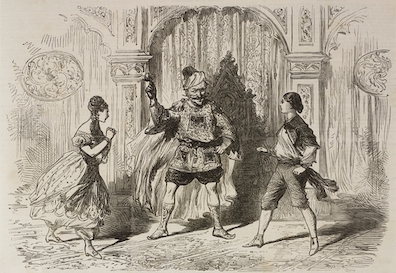Like Sindbad the Sailor, which figures prominently in
Ulysses, Turko the Terrible, or, The Fairy Roses
was a Christmas pantomime. Thornton notes that its first
Dublin performance was in 1873, initiating a long line of
pantomimes staged at the Gaiety
Theatre. He quotes from an 1899 review in The Irish
Playgoer that judged King Turko's ode to invisibility
the most successful song in the show, and he observes that in
Surface and Symbol Robert M. Adams suggests that the
show Joyce had in mind was not Turko itself, but an
1892 performance of Sindbad which reprised this one
highly popular song. The music survives, and in 2010 it was
given a spirited rendition in a café theater presentation of
Joyce’s songs in Bewley’s Café on Grafton Street. The artists,
Sinead Murphy and Darina Gallagher, bill themselves as the
Shannon Colleens.
These lines of light verse introduce a very serious
reflection three sentences later. Stephen moves from his
memories of his mother's trivial memories to the thought that
she is now "Folded away in the memory of nature"––a
reference to the theosophical idea of a universal memory of all
events in the history of the cosmos, preserved on the
spiritual plane that a person enters after death. His mother
has now entered that ineffable dimension and can perfectly
recall all the events of her life, not to mention those of all
other lives. She might very well say, then, "I am the girl
that can enjoy invisibility."
The text does not show Stephen thinking about the next step,
but it is logically implied by things he has said earlier and
will say later. If he succeeds in becoming the writer he
aspires to be, this transcendently powerful "invisibility" may
belong to him in this life. In part 5 of A Portrait of
the Artist, he described three hierarchically ranked
kinds of literary art: the lyric, the epic, and the dramatic.
The “dramatic” artist exceeds the powers of the others because
he transcends his own subjective position, submerging
authorial consciousness in the presentation of how life is
experienced by other people. This transcendence of ego makes
the dramatist comparable to God: “The artist, like the God of
the creation, remains within or behind or beyond or above his
handiwork, invisible, refined out of existence,
indifferent, paring his fingernails.”
Stephen has not yet found such sublime self-effacement. But
by characterizing it as divinely creative he has given himself
a goal to aim for, and the goal remains the same in Ulysses. In
Scylla and Charybdis, he maps the figure of the
self-effacing artistic god onto the dramatic artist par
excellence, William Shakespeare, who in writing his
plays, particularly Hamlet, became “a ghost, a
shadow now, the wind in Elsinore’s rocks or what you will, the
seas’ voice.” The idea that Shakespeare miraculously inhabited
the subjectivity of hundreds of different fictional people is
an old one, but Stephen gives it the distinctive spin of
ghostliness: personality that has somehow floated free of its
individual boundaries and can blow into the lives of others.
According to one critic, Ulysses contains an actual
ghost: the man in the macintosh that
Bloom sees in Hades. This figure mysteriously appears
among the mourners at Paddy Dignam's graveside and just as
strangely disappears, filling Bloom with incredulity: "Where
has he disappeared to? Not a sign. Well of all the. Has
anybody here seen? Kay ee double ell. Become invisible.
Good Lord, what became of him?" The ability to imperceptibly
come and go, leaving slight traces of oneself or none at all,
characterizes authors as well as ghosts. In Circe,
as Stephen and Bloom gaze into a mirror, “The face of
William Shakespeare, beardless, appears there, rigid in
facial paralysis, crowned by the reflection of the reindeer
antlered hatrack in the hall.” To Bloom, whose
cuckoldry the antlers reflect, the bard speaks: “Thou
thoughtest as how thou wastest invisible.”
